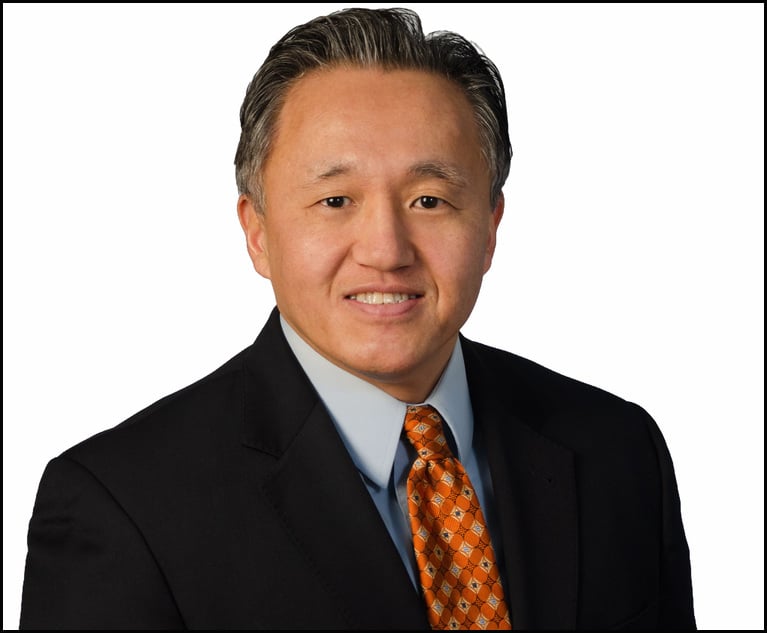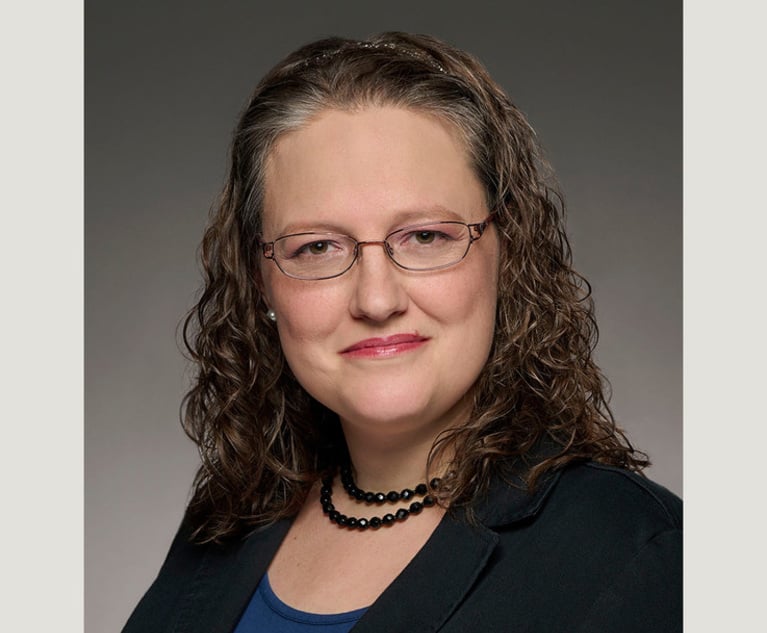Defendants Accelerate Efforts to Boot Infringement Suits Out of Delaware
A review of Delaware's federal docket has shown that defendants in patent infringement cases are increasingly citing Delaware's judicial vacancies in support of motions to transfer the cases out of the district after a visiting judge first raised the issue two months ago.
November 20, 2017 at 12:07 PM
6 minute read

Defendants in patent infringement cases are increasingly citing Delaware's judicial vacancies in support of motions to transfer the cases out of the district after a visiting judge first raised the issue two months ago, a review of Delaware's federal docket has shown.
In an unusual ruling, U.S. District Judge Mark A. Kearney on Sept. 15 invoked Delaware's depleted federal bench as a factor in his decision to transfer an infringement case against Apple Inc. to California, saying the case would have put an undue burden on an already overworked court.
“This district is now reduced to two active judges, only increasing the number of cases on each judge's docket here,” Kearney, who is visiting from the Eastern District of Pennsylvania, wrote in a 14-page memorandum approving the transfer.
In the two months since the decision in MEC Resources v. Apple, four of seven transfer motions have cited Kearney's ruling and the district's two open judgeships as a reason to send infringement suits to other jurisdictions. One other defendant has cited court congestion generally, without specifically mentioning the vacancies.
That stands in contrast to the two months preceding the decision, when just one of three transfer motions filed in the district cited the heavy caseload of Delaware's federal judges. During that period, however, not a single defendant included the issue of judicial vacancies in briefing on the motions.
On motions to transfer, judges typically weigh 12 Jumara factors to determine whether the convenience of sending a case to another district outweighs the deference given to a plaintiff's chosen venue. While court congestion is included among those factors, it had not generally been considered a leading concern for the parties.
In fact, the analysis of Delaware's federal docket showed that it barely registered with defendants in the months leading up to Kearney's ruling, even as the shorthanded court dealt with a wave of patent filings after the U.S. Supreme Court's TC Heartland ruling in May tightened the rules for establishing venue in patent infringement cases.
U.S. District Chief Judge Leonard P. Stark of the District of Delaware has enlisted a roster of visiting judges to help handle the workload until two new judges can be confirmed to replace District Judges Sue L. Robinson and Gregory M. Sleet, who announced their plans to retire earlier this year, before the decision in TC Heartland was announced.
In MEC, neither party had addressed court congestion in arguing the transfer motion. Still, Kearney, who had previously denied Apple's motion to dismiss the case, said it was a factor worth noting.
“While visiting judges can assist, we also must manage our busy urban dockets and, as much as we may try, cannot fully mitigate the loss of experienced judges in this district while we await commissions for new district court judges,” he said in the ruling.
George Pazuniak, a Wilmington attorney who represented MEC in the litigation, declined to comment on the specifics of the case, but he said that the ruling could indicate that Kearney's thinking has gained traction with other judges on the court.
“Not having been raised as an issue, you can see it reflects a judge's concern,” said Pazuniak, of O'Kelly & Ernst. “Given that it is one judge's concern, it may be other judges' concern.”
Edward Reines, a partner in Weil, Gotshal & Manges' Silicon Valley office, said defendants to Delaware infringement cases may have seized on Kearney's ruling as a signal that the court would be giving more thought to its available resources going forward. However, he said, there has been no indication that the vacancies have interfered with the court's ability to handle its caseload.
“I'm sure parties moving to transfer will attempt to invoke Judge Kearney's statement regarding vacancies,” Reines said. “It gives parties seeking transfer more room to argue congestion comfortably.”
No other judge—commissioned or visiting—has yet gone on record echoing Kearney's concerns about the vacancies, though Sleet has transferred a case based, in part, of the relative speed of the district.
Stark on Monday declined to comment on Kearney's ruling or its implications.
However, attorneys have taken notice.
Daniel A. Tallitsch, a partner with Baker McKenzie, called Kearney's MEC decision “very on point and helpful” and said “it wouldn't surprise me that other defendants are citing MEC.” Tallitsch, who is representing TTE Technology Inc. in an infringement suit by Interface Linx, filed a motion Oct. 4 to transfer the suit to a federal court in California, where both firms are based.
In a brief, Tallitsch and his team quoted extensively from MEC and argued that the court should not waste valuable resources on a case with only a limited connection to Delaware.
“Judge Kearney's reasoning applies equally in this case and weighs in favor of transfer,” the attorneys wrote. “Indeed, the limited resources of this district should not be used to resolve a dispute between two companies that are both located in the Central District of California.”
Tallitsch declined to further discuss the case because the motion to transfer is still pending.
Meanwhile, the vacancies do not appear to be going away in the near future. President Donald Trump has yet to announce his picks to fill the two vacancies, and it is not clear when the U.S. Senate would even move to confirm nominees to Delaware's federal bench.
Pazuniak, the attorney for MEC, said that continued briefing around the openings and their affect on the court's docket would continue to highlight the issue as an ongoing concern for the state's bench and bar.
“Whether it is a valid concern in the interests of justice is another question,” he said.
Interested in patent litigation? Join Law.com IP reporter Scott Graham for day-after analysis of the Supreme Court arguments in Oil States and SAS Institute. November 28, 9 AM PST/12 PM EST. Conference call is free to subscribers. For details and to register, click here.
This content has been archived. It is available through our partners, LexisNexis® and Bloomberg Law.
To view this content, please continue to their sites.
Not a Lexis Subscriber?
Subscribe Now
Not a Bloomberg Law Subscriber?
Subscribe Now
NOT FOR REPRINT
© 2025 ALM Global, LLC, All Rights Reserved. Request academic re-use from www.copyright.com. All other uses, submit a request to [email protected]. For more information visit Asset & Logo Licensing.
You Might Like
View All
3rd Circ Orders SEC to Explain ‘How and When the Federal Securities Laws Apply to Digital Assets’
5 minute read
Womble Bond Dickinson's Wilmington Office Sees New Leadership as Merger Is Completed
4 minute read

Trending Stories
- 1Quiet Retirement Meets Resounding Win: Quinn Emanuel Name Partner Kathleen Sullivan's Vimeo Victory
- 2Avoiding the Great Gen AI Wrecking Ball: Ignore AI’s Transformative Power at Your Own Risk
- 3A Lesson on the Value of Good Neighbors Amid the Tragedy of the LA Fires
- 4Change Is Coming in the Trump Era. For Big Law, Change Is Already Here
- 5Proskauer Partner Leaves for Fried Frank in London
Who Got The Work
J. Brugh Lower of Gibbons has entered an appearance for industrial equipment supplier Devco Corporation in a pending trademark infringement lawsuit. The suit, accusing the defendant of selling knock-off Graco products, was filed Dec. 18 in New Jersey District Court by Rivkin Radler on behalf of Graco Inc. and Graco Minnesota. The case, assigned to U.S. District Judge Zahid N. Quraishi, is 3:24-cv-11294, Graco Inc. et al v. Devco Corporation.
Who Got The Work
Rebecca Maller-Stein and Kent A. Yalowitz of Arnold & Porter Kaye Scholer have entered their appearances for Hanaco Venture Capital and its executives, Lior Prosor and David Frankel, in a pending securities lawsuit. The action, filed on Dec. 24 in New York Southern District Court by Zell, Aron & Co. on behalf of Goldeneye Advisors, accuses the defendants of negligently and fraudulently managing the plaintiff's $1 million investment. The case, assigned to U.S. District Judge Vernon S. Broderick, is 1:24-cv-09918, Goldeneye Advisors, LLC v. Hanaco Venture Capital, Ltd. et al.
Who Got The Work
Attorneys from A&O Shearman has stepped in as defense counsel for Toronto-Dominion Bank and other defendants in a pending securities class action. The suit, filed Dec. 11 in New York Southern District Court by Bleichmar Fonti & Auld, accuses the defendants of concealing the bank's 'pervasive' deficiencies in regards to its compliance with the Bank Secrecy Act and the quality of its anti-money laundering controls. The case, assigned to U.S. District Judge Arun Subramanian, is 1:24-cv-09445, Gonzalez v. The Toronto-Dominion Bank et al.
Who Got The Work
Crown Castle International, a Pennsylvania company providing shared communications infrastructure, has turned to Luke D. Wolf of Gordon Rees Scully Mansukhani to fend off a pending breach-of-contract lawsuit. The court action, filed Nov. 25 in Michigan Eastern District Court by Hooper Hathaway PC on behalf of The Town Residences LLC, accuses Crown Castle of failing to transfer approximately $30,000 in utility payments from T-Mobile in breach of a roof-top lease and assignment agreement. The case, assigned to U.S. District Judge Susan K. Declercq, is 2:24-cv-13131, The Town Residences LLC v. T-Mobile US, Inc. et al.
Who Got The Work
Wilfred P. Coronato and Daniel M. Schwartz of McCarter & English have stepped in as defense counsel to Electrolux Home Products Inc. in a pending product liability lawsuit. The court action, filed Nov. 26 in New York Eastern District Court by Poulos Lopiccolo PC and Nagel Rice LLP on behalf of David Stern, alleges that the defendant's refrigerators’ drawers and shelving repeatedly break and fall apart within months after purchase. The case, assigned to U.S. District Judge Joan M. Azrack, is 2:24-cv-08204, Stern v. Electrolux Home Products, Inc.
Featured Firms
Law Offices of Gary Martin Hays & Associates, P.C.
(470) 294-1674
Law Offices of Mark E. Salomone
(857) 444-6468
Smith & Hassler
(713) 739-1250






